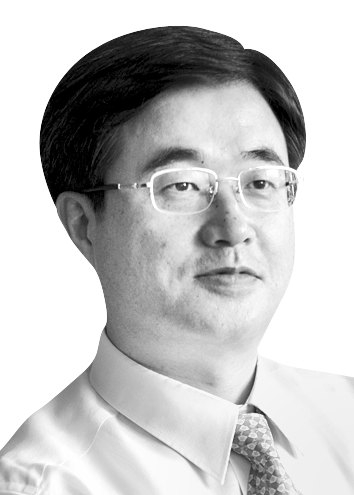Stop the gagging act

Kim Jung-kee
The author is an emeritus professor of journalism and mass communication at Hanyang University.
It was shocking to witness press oppression in the winter of the mid-1970s. The Dong-A Ilbo had to leave its ad section blank under dictatorial punishment. I saw the military government attempting to discipline the press and journalists by summoning them. But the case was on a different level. Outraged readers sent in donations to the newspaper company to publish their ad supporting the paper.
I still keep the ad piece our school alumni published. The ad, reading “We carry this ad in regret that we had failed to act out what we had learned at school,” is framed. The calligraphy work we received in gratitude of our donation dated February, 1975, read “Freedom, You Will Be Forever a Raging Volcano.” The governing power paid little attention to the dismay of the public and press. Protesting journalists were sacked and the newspaper gained its corporate ads back. The sitting power seemed to be smirking as if it would reign forever.
A few years later in 1980, a friend told me that the military government was drawing up a black list and the TV station where he was working as a novice producer could be shut down. The campaign sounded outrageous. But under the pretext of building a “just society” and promoting “healthy press,” 64 media organizations were forced to streamline. As a result, 14 newspapers, three broadcasters and one news agency were left. The life-or-death decision on media organizations and journalists was unilaterally made by the brutal governing force and its obeying intellectuals.
![Representatives of the seven major press organizations in Korea protest the Moon Jae-in administration’s push for a draconian revision to the Media Arbitration Act in front of the National Assembly on Aug. 30. [LIM HYUN-DONG]](https://img4.daumcdn.net/thumb/R658x0.q70/?fname=https://t1.daumcdn.net/news/202109/14/koreajoongangdaily/20210914084004530ihxp.jpg)
The reign of terror via ad sanctions and forced mergers did not last more than seven years. Oppression of the press, which is the guardian of a healthy democracy, eventually fails. “Tolerance in communication” is the keystone of democracy and cannot be denied. Democracy must ensure tolerance in communication so that an individual can freely speak his or her mind to be compared and reviewed, regardless of the intent and potential outcome. The press provides a platform where people with different thoughts can exchange views and criticisms to gain wisdom from the inevitable conflict. Democracy, therefore, grows in parallel with the freedom of the press.
Rep. Song Young-gil, head of the ruling Democratic Party (DP), scoffed at opposition lawmakers who protested a draconian revision to the Media Arbitration Act, asking if the opposition wished to stay on the opposition side forever. Song blatantly said that the DP will deal with the bill based on how much it will help win the next presidential election on March 9. He more or less admitted that the controversial law was being pushed ahead to make the media environment favorable for the government and DP. The idea of placing the media under the control of the government can only be imagined in an absolute monarchy like that of Louis XIV, who famously declared, “I am the state.” n the feudal days, the monarch and nobility found the public unreasonable and insensible so they must be taught and disciplined. In modern days, such a system would only end in dictatorship.
The new law has drawn a rush of criticisms as it destabilizes the press role of keeping watch over the powerful and any injustices they commit. It is being protested by all media organizations, including the pro-government ones. Even the UN Human Rights Commission and many renowned international press organizations share the view that the new act could seriously impair the people’s right to know and the freedom of the press.
A media law in a democracy must guarantee freedom of expression and liberal competition for information as well as sovereignty in news editing. The Korean press, which years ago fought for the truth behind the tragic death of a tortured student democracy activist, must not wither. The revised Media Arbitration Act cannot be a matter for negotiation between the ruling and opposition parties. The world is watching the developments as a litmus test for Korean democracy.
Translation by the Korea JoongAng Daily staff.
Copyright © 코리아중앙데일리. 무단전재 및 재배포 금지.
- Young people’s deaths after Pfizer vaccines are new worry
- Samsung settles on Taylor, Texas as site for new chip plant
- North Korea missile tests fly under the radars of South, U.S.
- Healthy man in 30s dies after first Pfizer dose
- Kakao founder Kim Beom-su feeling pressure
- Gov't promises to pay for pricey Covid pills
- Dark secrets of Korea's 'moon castle' are unearthed
- Online giants attract attention and restrictions
- THIS cigarettes succeed in the U.S.
- Deaths after Pfizer jabs worry the public